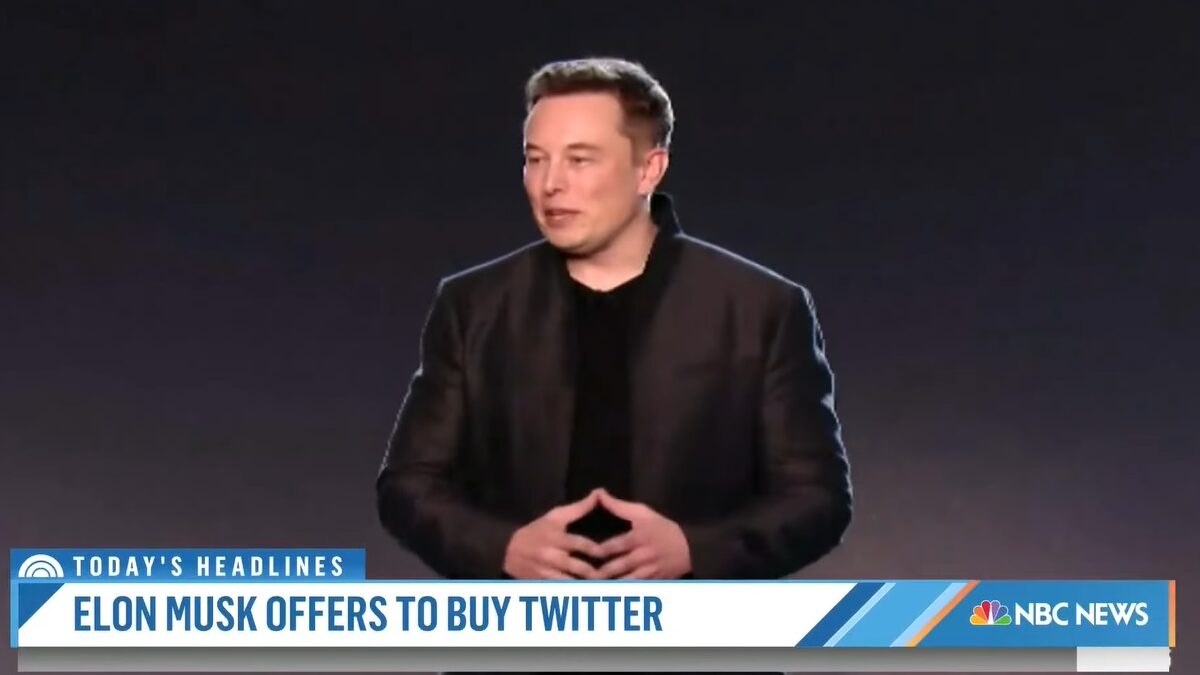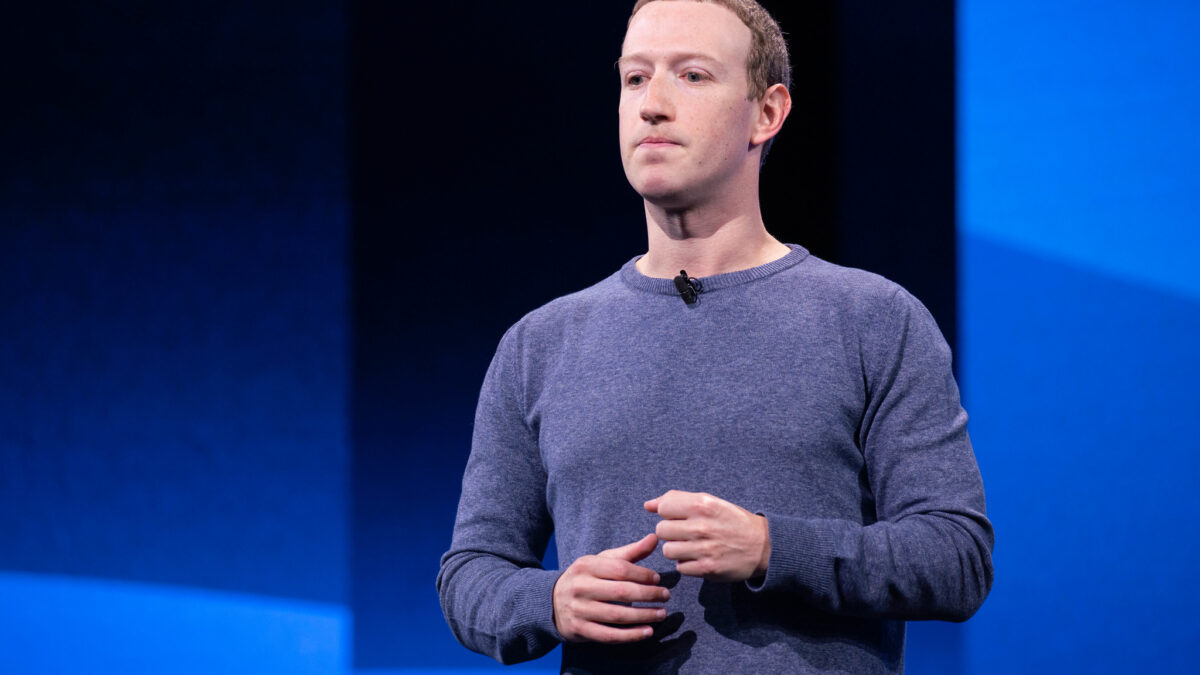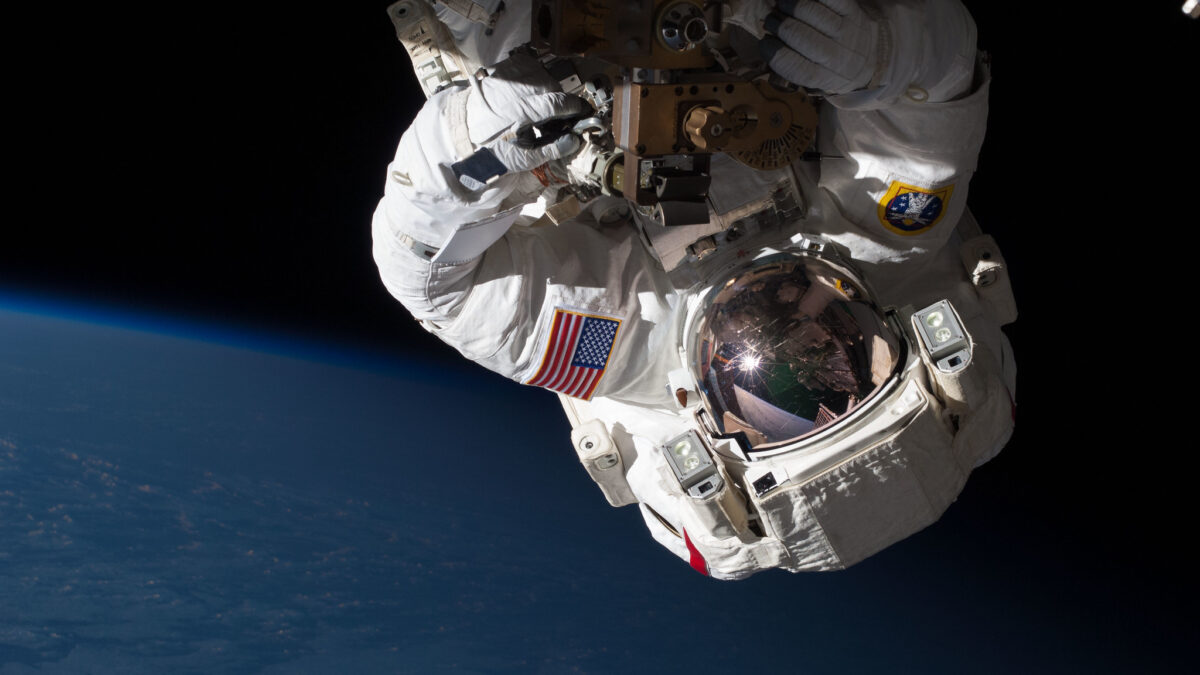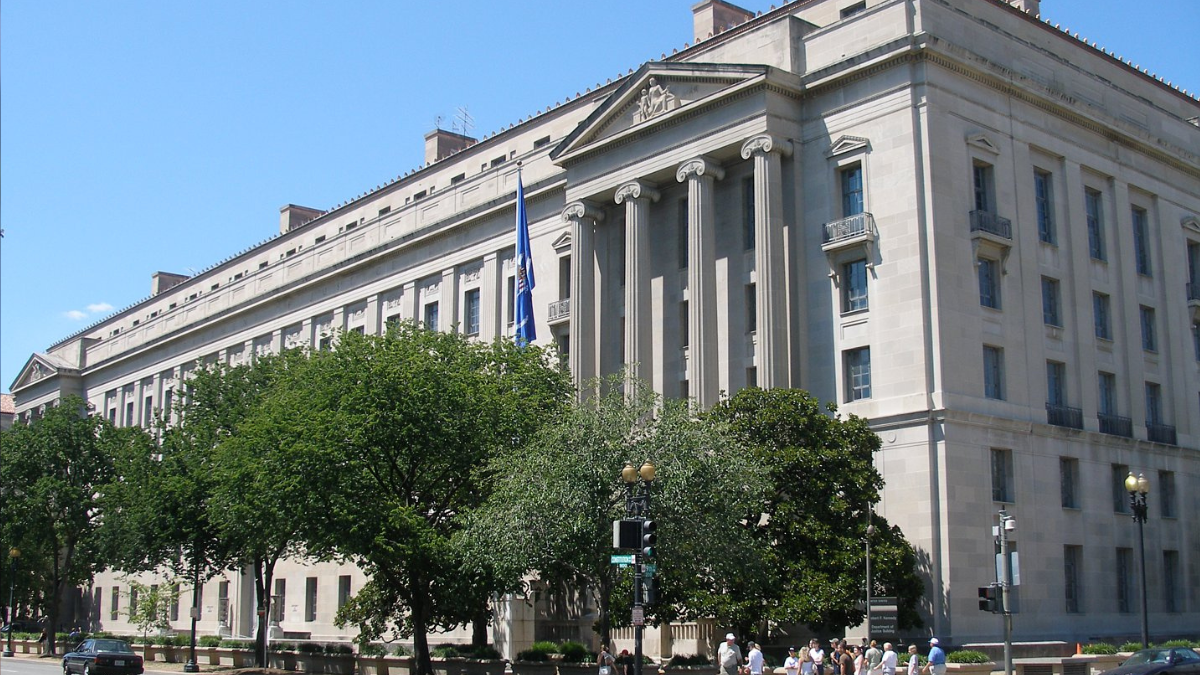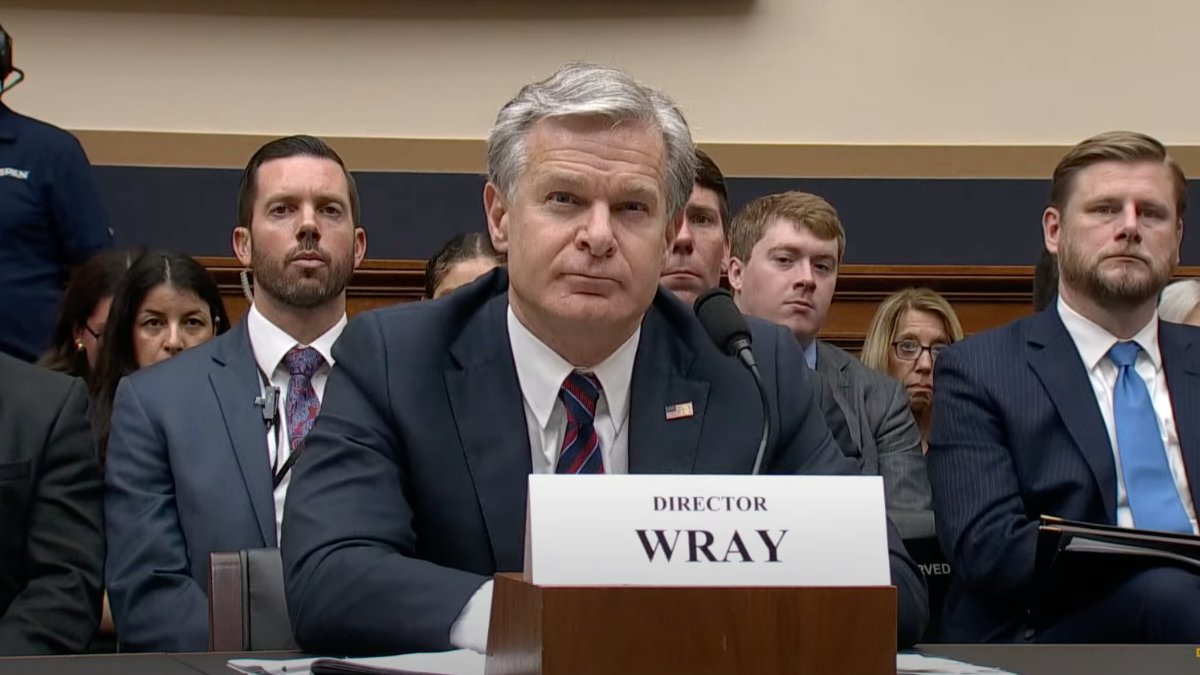Free speech laws mean nothing without a culture that supports them. Fostering such a culture, however, now appears to require billionaire financing, not among the few able to fund political campaigns, but from top-tier members of the billionaire class with the means to buy corrupted institutions outright and usher in an era of reform. Twitter has become such an institution, infected by left-wing desires for discriminatory censorship. Enter Elon Musk.
On Thursday, the billionaire entrepreneur and free speech activist behind PayPal, SpaceX, and Tesla offered Twitter $43 billion for a total buyout at $54.20 a share, priced at a premium nearly 20 percent above market value.

The proposal begins the latest episode in Musk’s effort to develop direct influence in the company after years of hostile censorship of conservative content exposed the platform as an ideological outfit working to serve left-wing interests.
Weeks before the 2020 presidential election, Twitter barred users from sharing blockbuster stories from the New York Post that implicated then-candidate Joe Biden in his son’s potentially criminal overseas business deals. One in six Biden voters across seven tipping-point states said they would have changed their vote had they been adequately informed about the scandals.
Four months later, the company banned President Donald Trump while he was still in office. An account for Russian President Vladimir Putin remains active. Last month, Twitter censored the accounts of Fox News’s Tucker Carlson, Turning Point USA’s Charlie Kirk, The Federalist’s John Davidson, and the Christian/conservative satirical website Babylon Bee, each for claiming President Joe Biden’s Assistant Secretary for Health Rachel Levine, who identifies as transgender, is a man. On Wednesday, Twitter’s popular “Libs Of Tik Tok” page was given a 12-hour suspension for “hateful conduct,” a vague term weaponized by the company’s employees to justify censorship of viewpoints they just don’t like.
Musk’s interest in corporate Twitter was reportedly driven by the company’s March censorship of the Babylon Bee as “the last straw,” according to Bee CEO Seth Dillon, who said the billionaire reached out before purchasing a 9.2 percent stake in the tech giant to become its largest shareholder. The Babylon Bee account remains locked for posting an article headlined “The Babylon Bee’s Man of the Year is Rachel Levine” to mock USA Today’s award to Levine as “Woman of the Year.”
Musk asked his more than 80 million followers what should be done given Twitter “serves as the de facto public town square” but was “failing to adhere to free speech principles” days after the Bee’s account was frozen.
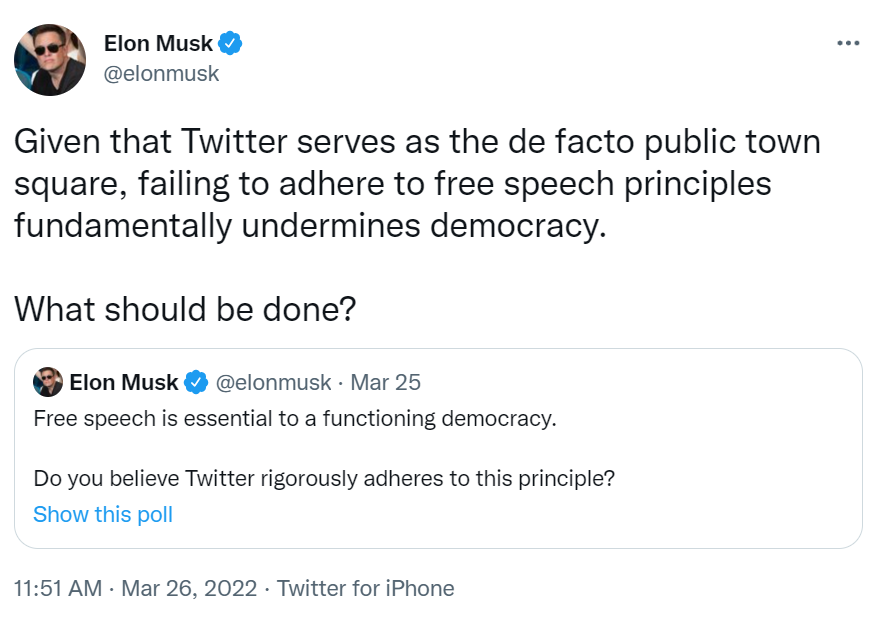
“We have had some communication with Musk,” Dillon told The Washington Times. “He wanted to confirm that we had, in fact, been suspended from Twitter. He reached out to us before he publicly asked his followers if they think Twitter ‘rigorously adheres’ to the principle of free expression. He even mused on that call with us that he might need to buy Twitter.”
But will Musk actually save Twitter as a “public town square” and shape the platform into a democratic beacon of free expression? Even if his lucrative offer were to move forward and be approved, which is unlikely, the Silicon Valley headwinds against a free speech platform may already be too great. In January last year, Apple, Google, and Amazon colluded to take down Twitter’s free speech-branded alternative in Parler. Trump’s network launched earlier this year, TruthSocial, has struggled to cultivate apolitical users, and is already “branded a disaster” by the corporate media. It’s not inconceivable the same could be done to Twitter with Musk at the helm steering the company away from the totalitarian censors.
But is it a healthy sign that free speech, a fundamental prerequisite for a sustainable democracy, requires a billionaire savior? Will Musk even be the savior he claims to be? His openness to work with overseas authoritarians has certainly raised eyebrows.
Meanwhile in the era of billionaire control of the public square, Mark Zuckerberg continues to wield control over Facebook while the allied censors working for Jeff Bezos’s Washington Post are up in arms over the possibility of a free speech advocate as Twitter’s new chief.
“Elon Musk launches hostile takeover bid for Twitter,” headlined an article branded as news in the Bezos-dominated Post.
Columnist Max Boot, working for the same paper, warned Musk’s new venture could spell the end of democracy.
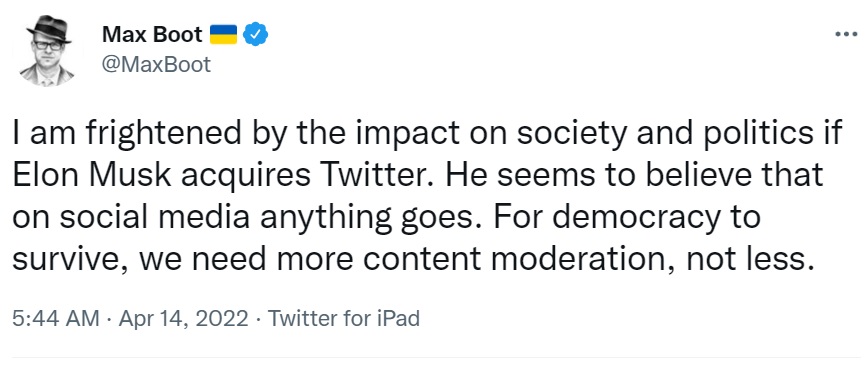
The 2020 election, however, taught us how dangerous concentrated control of the 21st-century digital public square could be for a country where no small population is eager to silence the opposition. But the overt censorship throughout the presidential contest is far from the only rude awakening to the risks presented by the modern structure of information sharing.
The nation’s oligarchal giants have been eager since the novel Wuhan coronavirus was introduced to endlessly censor those who made claims contrary to the media-manufactured Faucian consensus on masks and lockdowns. Despite the devastating consequences of lockdowns and school closures, leading experts were kicked off major platforms while the public succumbed to what Dr. Robert Malone dubbed hysteria-driven “mass formation psychosis.”
Dedication to free speech requires broad support beyond the billionaire class. Musk might be good for Twitter and the internet in the short term, but the current model of waiting for billionaires to sweep in as champions of the cause isn’t sustainable.
